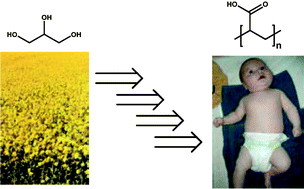Investigations on using renewables as alternative raw materials for intermediates are becoming more and more important as the crude oil and natural gas resources will be exhausted in a few decades. Acrolein is an important and versatile intermediate for the chemical industry, e.g. for the production of acrylic acid esters, superabsorber polymers or detergents. Up to now, the production route is the gas phase oxidation of propylene with a Bi/Mo-mixed oxide catalyst. As an alternative, acrolein can be produced by the dehydration of glycerol, which appears as a basic component of natural fats and is accumulated to a great extent as a by-product during fat saponification and biodiesel production. Here, the usage of sub- and supercritical water as the reaction media has shown a certain potential for the dehydration of glycerol, although the conversion and acrolein selectivities which have been achieved so far, are not satisfying for an economical process. Only the addition of mineral acid leads to sufficient acrolein yields. To evade the disadvantage of intensifying corrosion, the influence of the addition of electrolytes such as zinc sulfate on this reaction has been investigated. Experiments were conducted in a high pressure plug flow reactor from 300–390 °C, 25–34 MPa, 10–60 s residence time and varying amounts of zinc sulfate. It was shown that in the near subcritical temperature, increasing the amount of salt enhances the glycerol conversion. The maximum acrolein selectivity is 75 mol% at 360 °C, 25 MPa, 470 ppm (g g−1) zinc sulfate and a conversion of 50%. The activation volume was determined to be −(274 ± 65) cm3 mol−1 (at 360 °C, 25–34 MPa and 790 ppm (g g−1) zinc sulfate) and it turned out that the addition of zinc sulfate causes a decrease of the activation energy from 150 kJ mol−1 to (140 ± 12) kJ mol−1.

You have access to this article
 Please wait while we load your content...
Something went wrong. Try again?
Please wait while we load your content...
Something went wrong. Try again?


 Please wait while we load your content...
Please wait while we load your content...